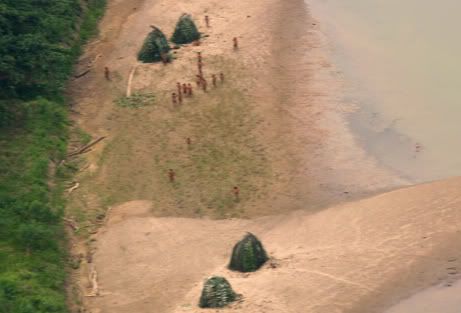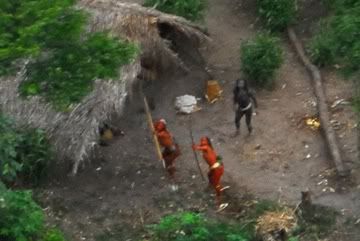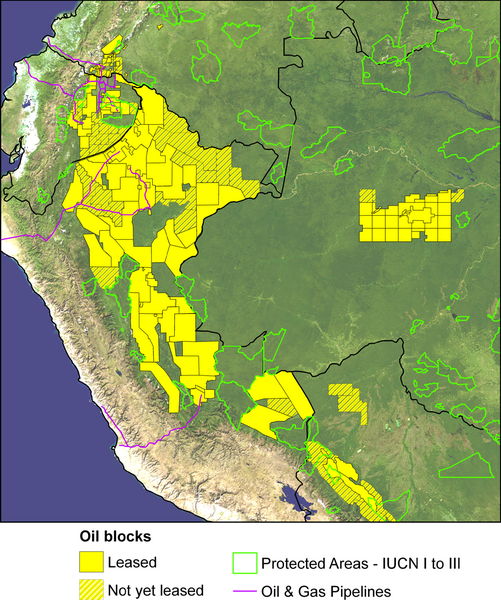(noon. – promoted by ek hornbeck)
 You know the saying that if a tree falls in the forest and no one is there to hear it, did it really make a sound? Well, some governments and companies are banking that the public needs to hear or see uncontacted tribes before we care that they are being killed or relocated in the name of oil and mahogany. Companies are invading indigenous lands of uncontacted tribes causing their deaths, yet officials claim that unseen tribes are nonexistent mythical creations of anti oil and logging developments. The tribes are then forcibly relocated or members killed sufficient to terminate the tribe’s continuity with future generations. Yet, some would like the public to believe that no one was harmed because the tribes are mythical.
You know the saying that if a tree falls in the forest and no one is there to hear it, did it really make a sound? Well, some governments and companies are banking that the public needs to hear or see uncontacted tribes before we care that they are being killed or relocated in the name of oil and mahogany. Companies are invading indigenous lands of uncontacted tribes causing their deaths, yet officials claim that unseen tribes are nonexistent mythical creations of anti oil and logging developments. The tribes are then forcibly relocated or members killed sufficient to terminate the tribe’s continuity with future generations. Yet, some would like the public to believe that no one was harmed because the tribes are mythical.
 After civil, environmental and native organizations demanded that governments and the courts rein in oil development in the indigenous territorial lands of the Amazon rainforest, the Peruvian government maintained that isolated tribes were mythical creations of environmental groups to stop oil development. Evidence has been provided of their existence many times, including an October 2007 picture, obtained by a plane searching for illegal loggers, which shows 21 “unseen” natives standing near palm housing.
After civil, environmental and native organizations demanded that governments and the courts rein in oil development in the indigenous territorial lands of the Amazon rainforest, the Peruvian government maintained that isolated tribes were mythical creations of environmental groups to stop oil development. Evidence has been provided of their existence many times, including an October 2007 picture, obtained by a plane searching for illegal loggers, which shows 21 “unseen” natives standing near palm housing.
This picture was shown via international news wires, but days later Peruvian President Garcia insisted that “unseen” tribes were a ruse manufactured by environmentalists opposing oil development:
“Against petroleum, they have created the figure of the ‘unconnected’ wild native, which is to say, something not known but presumed,” Garcia wrote in an editorial in the newspaper El Commercio.
 In May 2008, photos of another isolated tribe were released to prove their existence. The Brazilian government was conducting flights to find and protect isolated tribes. When the plane returned later in the same day, the tribe had painted their bodies and armed themselves, showing that the tribes “understand that contact with the outside world spells danger.”
In May 2008, photos of another isolated tribe were released to prove their existence. The Brazilian government was conducting flights to find and protect isolated tribes. When the plane returned later in the same day, the tribe had painted their bodies and armed themselves, showing that the tribes “understand that contact with the outside world spells danger.”
Once again, in July 2008, Peruvian officials maintained that the isolated tribes do not exist any more than the Loch Ness monster:
“It is like the Loch Ness monster,” Cecilia Quiroz, lead counsel of Peru’s oil and gas leasing agency, told The Washington Post in July.
“Everyone seems to have seen or heard about uncontacted peoples, but there is no evidence.”
These unseen tribes are such a ruse that oil companies from the US and Spain prepared a manual in 2007 to advise their workers how to interact with the unseen tribes that do not exist.
Even before these recent photos, the Peruvian government knew that isolated tribes existed. In 2006, Peru passed the “Law for the Protection of Isolated Peoples in Voluntary Isolation” to create land reserves to protect the isolated tribes which President Garcia was now claiming were mythical. A year later, President Garcia was so worried about nonexistent tribes interfering with oil development so he issued a decree to allow reserves for isolated tribes to be “exploited for their natural resources.” Mass protests by indigenous peoples forced their Congress to overturn Garcia’s decrees.
The problem for the government-oil industry complex is that if there is evidence of uncontacted tribes, particularly public disclosure of that evidence, then the tribes are protected by reserving their lands from invaders: The oil explorations, loggers, gold-miners and ranchers. And land reserved is land not available to the corporations for exploitation.
 Conflict arises because oil and gas companies have concessions on lands, including indigenous territories, which includes both land titled to tribes or currently inhabitated by tribes. How cool is it that key information for my diary is a study co-authored by another kossack, American Zapatista, about the impacts of oil development on indigenous peoples and biodiversity in the Western Amazon. This study shows how in Peru, for example, 58 of the 64 oil blocks “overlay lands titled to indigenous peoples” and 17 blocks “overlap areas that have proposed or created reserves for indigenous groups in voluntary isolation.”
Conflict arises because oil and gas companies have concessions on lands, including indigenous territories, which includes both land titled to tribes or currently inhabitated by tribes. How cool is it that key information for my diary is a study co-authored by another kossack, American Zapatista, about the impacts of oil development on indigenous peoples and biodiversity in the Western Amazon. This study shows how in Peru, for example, 58 of the 64 oil blocks “overlay lands titled to indigenous peoples” and 17 blocks “overlap areas that have proposed or created reserves for indigenous groups in voluntary isolation.”
In order to reach these natural resources, it means working on the territorial lands of the isolated tribes, which means contact in some form. The oil barons, loggers and some government officials decided not to let human life stand in the way of their race to ravage the natural riches of the Amazon rainforest. The answer was a “quiet” genocide of the isolated tribes. I say quiet because many people around the world may not know that people were and are being killed in remote communities hidden from the outside world. In fact, a Brazilian government official used the word “genocide” to describe the deaths of uncontacted tribes caused by illegal ranching and logging.
Contact has been used as a weapon to commit this genocide, which is defined under international law to include killing, serious bodily injury or mental harm, inflicting conditions calculated to cause its physical destruction and measures used to prevent births with intent to destroy wholly or partially a racial or ethnical group.
Sometimes the contact is armed killings in which the only survivors are relatives who can not marry or persons who no longer are of child-bearing ages. Such targeted killings insure the prevention of births from the tribes and thus the eventual extinction of the tribe:
The experience of the Akunsu tribe in neighbouring Rondonia, contacted a little over a decade ago, is not unusual. Today, only six members of the tribe survive. All relatives, they cannot marry and the group is expected to die out within a generation.
One of the survivors said they were overrun by loggers who sent gunmen into their areas to drive them out. Under Brazilian law, land occupied by Indians cannot be cultivated so ranchers make sure that no Indians survive.
(video of Akunsu tribe’s remaining members below in part 2 at end of diary)
Armed killings are not necessary in order to wipe out tribes. The tribes are also killed by any personal contact with us because they do not have any immunity from our diseases or defenses to our common cold. One native-rights group has threatened to sue oil companies for genocide if they enter the lands of the tribes because “in recent years fatal illnesses have beset tribes like the Nahua, Nanti, and Kirineri after they came into contact with oil workers.”
In fact, history shows that after first contact, it is very common for more than 50% of a tribe to die, and sometimes the entire tribe. In the 1970s, “185 members of the Panara tribe died within two years of discovery after contracting such diseases as flu and chickenpox, leaving only 69 survivors.”
Or, some loggers take a more indirect route of blocking trails to force tribes off their land because “loss of land can mean death for hunter-gatherer tribes like the Piripkura… .”
We can’t ignore our role in the linkage between free trade and the deaths, forced relocations or loss of culture for isolated tribes . The free trade agreement (FTA) that the US signed with Peru in 2007 led to mass protests and strikes in Peru to object to the the now easy access for oil and lumber companies to the natural resources of the rainforest. The decrees issued by President Garcia were designed to make their laws consistent with the FTA. The FTA not only legalizes the destruction of the rainforest, but access to those rich resources located on indigenous lands is “now leading to the mass displacement and mass deaths of formerly ‘undiscovered’ indigenous tribes” — all in the name of mahogany and oil.
Fortunately, more and more people are hearing the voices of the “mythical” tribes that don’t exist.
Uncontacted Tribes part 2 of 2

15 comments
Skip to comment form
Author
for month and 1/2, could not post here after picking up trojans that i picked up at a porno site that i accidentally hit upon!
BTW, i luv the blue and the new posting system, much easier!
IS HERE
and walk and do so many things differently.
i’ve been banned from political talk at my family’s dinners. because they don’t like it when i tell them our lifestyle choices force unknown others to suffer. like native people being pushed out of traditional lands, then moving further into forests and competing with other earthlings (includes both plants and animals).
this is horrible. really and truly horrible. we have no right to do this. further, we need to bring to justice all those under American jurisdiction for any such crimes.
to post the videos, take out the last allowscriptaccess=”always” in the code.
the treatment of Iraqis in the quest to control access to their oil.
“I’d like to be a president [known] as somebody who liberated 50 million people and helped achieve peace”
— George Bush
does anybody hear?